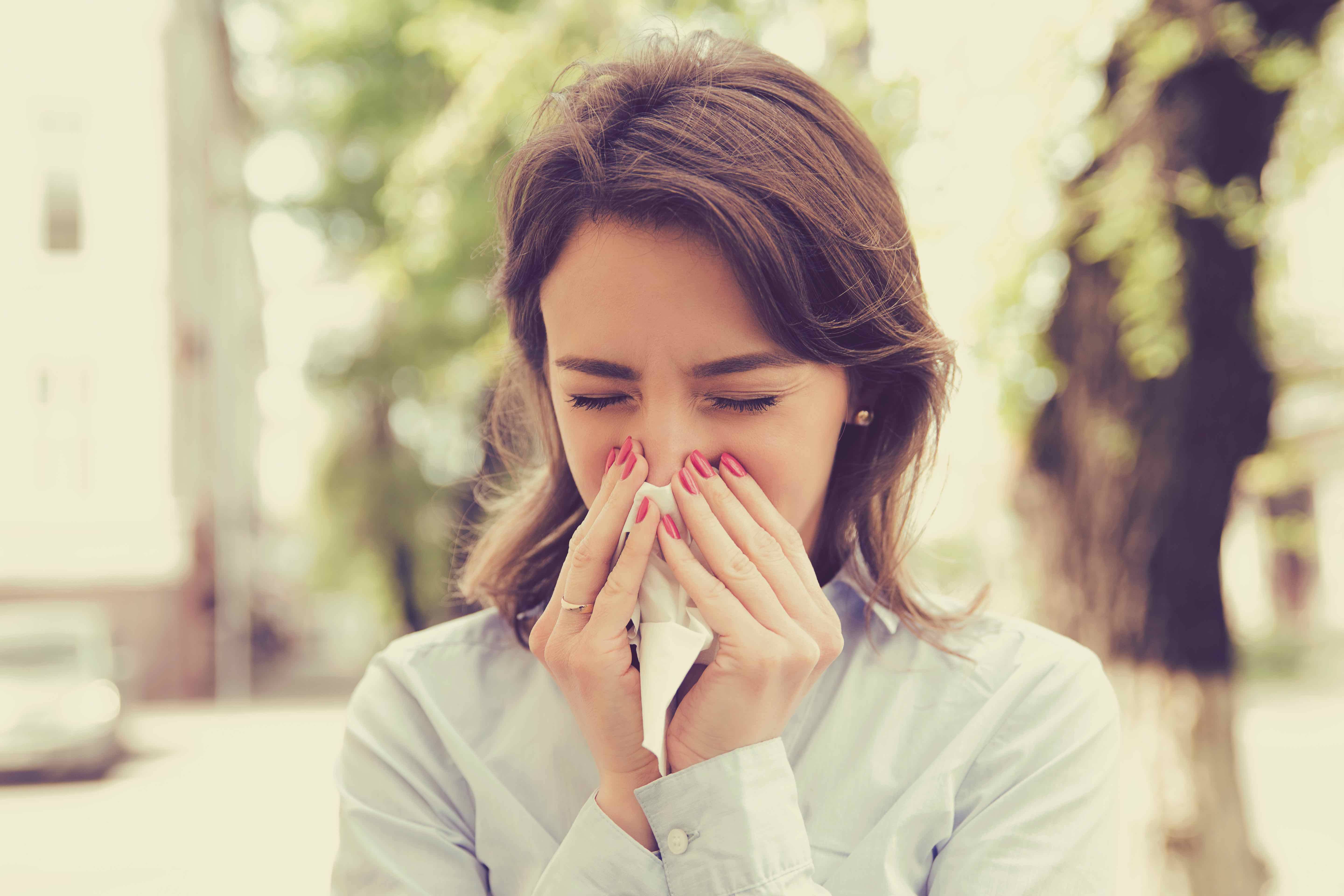How to Survive Philly’s Rough Allergy Season, According to a Local Expert
Allergy specialist Elina Toskala gives us her tips for navigating the trees, grass, and weeds that make us sneeze.

Allergy season is in full swing in Philly. Here’s how to navigate it. / Photograph courtesy Getty Images
In Philly, winter doesn’t ease into spring. This year especially, it seemed like the warmer, greener season unfurled its leaves overnight (like this cool botanic garden in Tucson where all the flowers of one species bloom at the exact same time!). One day, we simply woke up to buds and bugs — and our fair share of bless you’s.
That’s right, our greenery comes with a sneeze-inducing price: pollen. Pollen counts have been on the rise, particularly in the northern areas of the country, for a while now. Much of that increase can be tracked to warmer temperatures and a greater profusion of carbon dioxide — the consequences of climate change. (Just another reason to go car-free and eat less meat.) CO2 is essentially food for plants, and the more they have of it, the more they can grow, flourish, and, unfortunately, produce allergens.
And we’re seeing plenty of them in Philly; the Asthma and Allergy Foundation of America ranked our city the 25th most challenging place to live (out of the 100 largest cities) with spring allergies this year, up five spots from 2018. But we don’t think shutting yourself away in your house all the time is the answer to the problem. That’s why we turned to Elina Toskala, director of allergy at Temple University Hospital and the chief of otolaryngology/head and neck surgery at Jeanes Hospital, to see what exactly is going to make our eyes water and how we can get through this trying time.
BWP: Why does it seem like *everyone* has allergies these days?
Toskala: Allergens are harmless proteins in our environment that we overreact to. Our environment has changed over time, so we don’t get as much exposure to infectious diseases like polio and TB as we did 50, 60 years ago. [While that’s good], we also don’t get exposed to as many microbes, and that’s partly why we develop sensitivities to allergens. There’s evidence, for example, that children living on farms get less allergies because their microbiome gets more exposed to different microbes in the environment. If they move out to the city, though, they’re in the same boat as all of us.
Is this the worst time of year for allergies here in the city?
It depends on what you’re allergic to. In the early spring, we have very high tree pollen from oak, ash, and elm. Also, pine can cause allergies. Often the tree pollen really hits you hard because you haven’t had anything during the winter. We start to get grass pollen mid-summer for those who are allergic to grass. Very common ones are Johnson and Timothy grass. At the end of the summer, we get weeds like ragweed. If you’re lucky and allergic to tree pollen and grass pollen and weed pollen, you’re going to be symptomatic until the end of the summer.
Greaaaaat. Any tips to deal with all that pollen?
Maybe avoid going to the forests for the next two weeks. If you’re very lucky, take the time to travel south, somewhere like Florida, until the trees aren’t quite as bad. Otherwise, what you can do first of all is close the windows, so you don’t get the pollen inside. Check your air conditioner and your filter, so they are clean from last year’s pollen collection. You can use salt water rinses or nasal cavity sprays to reduce your exposure to pollen.
What about medications?
The best medications for allergens are steroids and topical and oral antihistamines [(think: Zyrtec, Claritin, Allegra)]. It doesn’t really matter too much on the brand. All are quite effective, and many are now available over the counter. The steroids can reduce the inflammation of your airway, and the nasal ones do help with the nose; keeping your nose open can help you breathe better. Your antihistamine can help with lower airway and eye symptoms. You can use your inhaler as well for asthma.
If you’re not responding to medication, talk to an ear, nose, and throat doctor or an allergist. At that point, you can think about immunotherapy — allergy shots — which you take over three to five years. They’re not going to be a quick cure now but something to think about for the following season.
Is there anything we shouldn’t be consuming during allergy season, medication or otherwise?
The steroids are basically tolerated by anybody unless you have a nasal bleed. But check with a physician. There are a few medications you might already be taking that can have a cross-reactivity with an antihistamine.
Some people also have cross reactions with certain foods — melon, apples, bananas, celery, some other vegetables with similar proteins to the tree pollen that’s in the air. It’s called oral allergy syndrome. Once allergy season winds down, you can eat these foods again. It’s interesting that you don’t always get it every time — it seems to be a little bit dependent how you’re doing allergy wise and how much that food happens to have that reactivity.
Anything else to add?
Every year it comes as a surprise, like ‘Now we have a pollen season again.’ It’s definitely not an easy year — we can already see that. If nothing else, there are websites where you can check pollen counts for the day or weekend to see if there are better days for you to go outside. [We recommend subscribing to the Asthma Center’s daily pollen and mold spore updates for the area.]
This interview has been edited for clarity and brevity.
This article has been updated.


